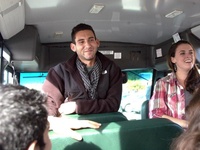Gerbrandt, a native of Canada, said he became involved with the Harvard Democrats because he was interested in progressive causes, despite the fact that he could not vote in the United States. “It also seemed like the logical thing to do, especially during a midterm election,” he said.
A few hours later, after Gofman and Gerbrandt had visited the 65 houses on their list, the campaign driver returned them to campaign headquarters, where they left telephone messages for the voters who were not home.
When the Harvard group piled onto the bus around 4:30 p.m., not all of the 35 volunteers were present. About five, including Berkenfeld and Wenger, stayed to sleep on floors and couches in supporters’ houses and continued canvassing and phonebanking for the next few days.
Reluctantly, Gerbrandt got on the bus back to Harvard to work on his Expos paper. His time in Cambridge was brief—the next morning, he was back on the bus to Manchester.
A CLUB, AND PARTY, REENERGIZED
There’s an increased level of engagement and energy in the Harvard Republican Club this year, according to Kevin R. Palmer ’13, the club’s vice president for social events.
While the group’s membership levels haven’t increased—hovering at around 79 dues-paid members—“there’s more energy,” Palmer said.
With the Republicans likely to take back a number of seats in the election, the club had a core group of members who spent the political season campaigning to make this happen in Massachusetts, New Hampshire, and Connecticut.
Palmer remembered one particular house in Connecticut he visited while canvassing for McMahon with the club. The voter opened the door while on the phone and was clearly displeased to find solicitors—but his demeanor changed once he saw their Linda McMahon pins. “Hey, I’m going to have to call you back. They’re with Linda,” he told the person on the line, and proceeded to talk with Palmer about McMahon.
The increased support for Republicans this election season, said HRC President Mark A. Isaacson ’11, is partially a result of voters’ top two issues this election: the economy and jobs.
“No one even had to think about it,” he said. “You can really sense the voter’s dissatisfaction with government and politics broadly.”
Though they have spent a few days campaigning for McMahon in Connecticut and senator-elect Kelly Ayotte and Congressman-elect Frank Guinta in New Hampshire, the majority of the Republicans’ efforts were in state.
The group had been canvassing and phonebanking for defeated Massachusetts gubernatorial candidate Charles D. Baker ’79 regularly. Ten to 15 people headed to Baker’s campaign headquarters every other Thursday night to phonebank, and four club members interned for Baker. Outside of the club, there were a handful of other Harvard students also interning for Baker, said Rachel L. Wagley ’11, HRC vice-president of campaigns and activism.
The group considered going to New Hampshire again last week but ultimately decided to stay in Massachusetts and campaigned for local races. “New Hampshire is in the bag for us,” Wagley said.
CAMPAIGNING CLOSER TO HOME
Read more in News
Student Groups View Election ResultsRecommended Articles
-
Tuesday Market Ends for SeasonThe Harvard Farmers’ Market concluded its four-month season in front of the Science Center yesterday with a tour of the ...
-
 Not your Average Candidate
Not your Average Candidate -
 College Republicans Go Door-to-Door
College Republicans Go Door-to-Door -
Harvard Democrats Face Choice: Massachusetts or New HampshireA razor thin lead for President Barack Obama in New Hampshire and a Massachusetts Senate race that is too close to call have Harvard College politicos racing to Nov. 6, forced to decide where to invest their diminishing time and resources.















